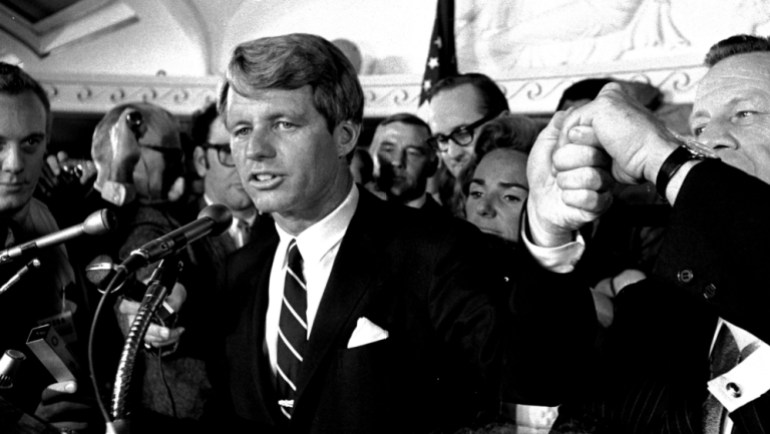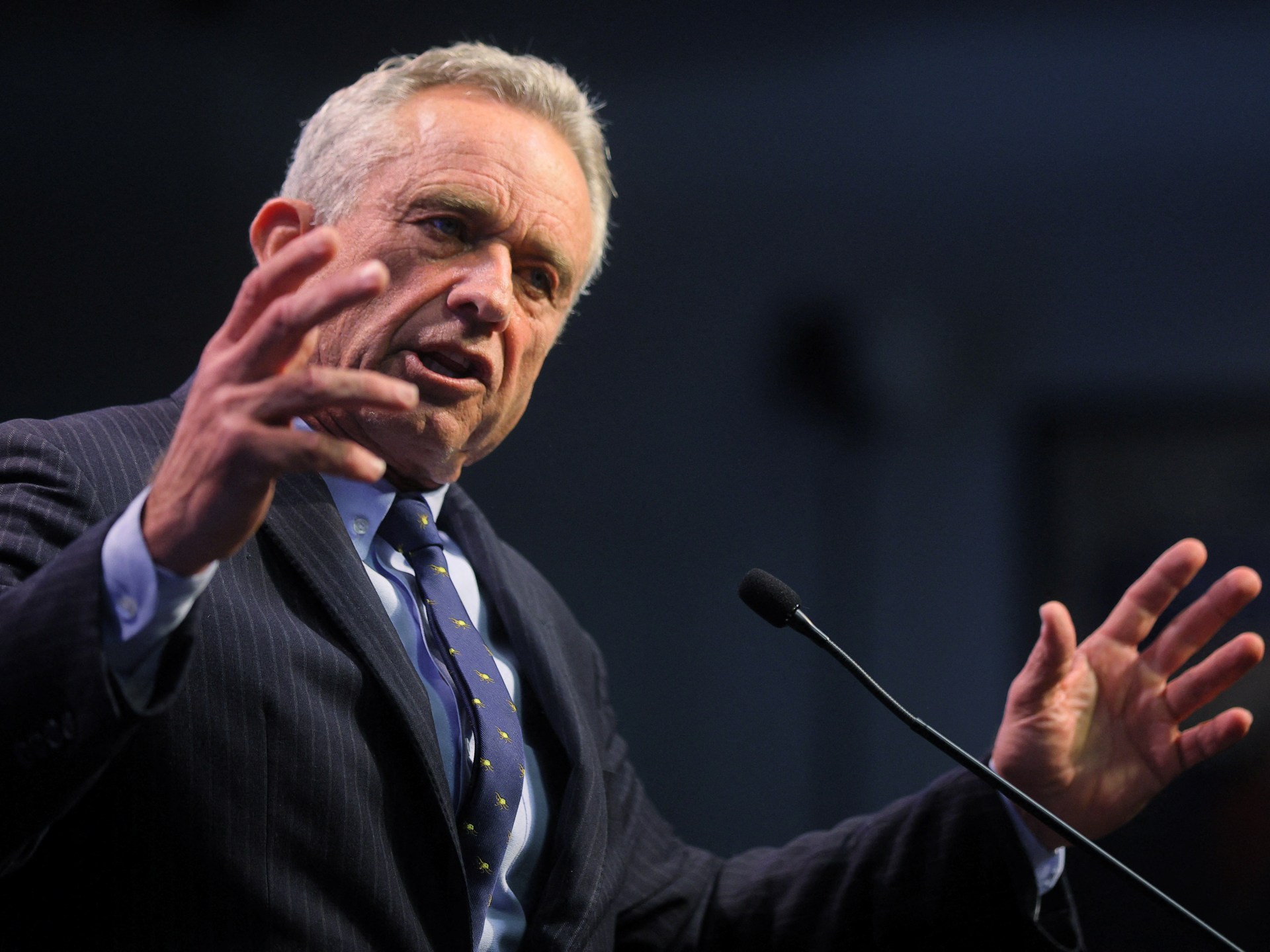Who is election disrupter Robert F Kennedy Jr? | Elections
Robert F Kennedy Jr, scion of the most famous United States political dynasty, will announce his running mate on Tuesday as he competes as an independent candidate in the 2024 US presidential election.
The odds are stacked against him as no third-party candidate has won the presidency in more than a century and a half.
But the longtime environmental lawyer and anti-vaccine activist has been able to create a media buzz, thanks to his strong brand recognition: His uncle was former President John F Kennedy, and his father was Robert F Kennedy, a former US attorney general and senator.
He ditched the Democratic Party after failing to secure its presidential nomination and is playing to both far-left and far-right elements in his long-shot bid for the White House.
His campaign appears to be resonating among so-called double haters, who dread the prospect of a rematch between incumbent Joe Biden and former President Donald Trump, who is the frontrunner to win the Republican Party’s nomination despite his legal woes.
Recent opinion polls indicated that while he might take voters from both candidates, it is Biden whom he could hurt the most.
Amid a climate of political disenchantment, Kennedy has projected himself as a political outsider and blasts “corporate kleptocracy” while touting his environmental credentials.
A longtime vaccine sceptic, he has been accused of spreading misinformation about the COVID-19 vaccine on alternative media outlets, such as conservative host Joe Rogan’s popular podcast. Rogan has also been accused of spreading falsehoods about COVID-19 vaccines on The Joe Rogan Experience.
While Kennedy’s detractors have branded him a conspiracy theorist, his supporters hail him as a truth teller.
So who is this political freewheeler? Where does he come from? What does he think, and does he really stand a chance of winning?
What is Kennedy’s background?
Kennedy’s family name evokes privilege and tragedy in equal measure. He was just nine years old when President John F Kennedy was shot dead in November 1963. His father, Robert, suffered the same fate while mounting his own presidential bid five years later.

Grief-stricken, RFK Jr turned to heroin to “fill an empty space inside of me”, finally getting clean after an arrest for possession. His second wife, Mary, mother of four of his six children, also battled addiction and died by suicide. He is now married to Cheryl Hines, famous for her role on the sitcom Curb Your Enthusiasm.
Kennedy suffers from a speech impediment called spasmodic dysphonia, which causes muscles in the larynx to spasm, although the condition has not seemed to have dented his performance on shows hosted by the likes of Rogan and conservative Canadian best-selling author Jordan Peterson, where his shoot-from-the-hip style plays well.
His controversial views have led his own family to disavow him. “Bobby might share the same name as our father, but he does not share the same values, vision or judgment,” his siblings said in a statement posted on X. “We denounce his candidacy and believe it to be perilous for our country.”
Bobby might share the same name as our father, but he does not share the same values, vision or judgment. Today’s announcement is deeply saddening for us. We denounce his candidacy and believe it to be perilous for our country. @roryekennedy @joekennedy @KKT_Kennedy pic.twitter.com/WJfGwSxN1z
— Kerry Kennedy (@KerryKennedyRFK) October 9, 2023
What does he stand for?
Not one for sticking to a script, Kennedy holds a mixed bag record of often contradictory views that make him difficult to pigeonhole.
Take the environment. Once named a “Hero of the Planet” by Time magazine, the former environmental lawyer is known for his campaigns to clean up the nation’s waterways, reduce the use of toxic pesticides and promote renewables. Yet his calls for “freedom and free markets” as a solution to climate change have raised fears that he would let industry set the pace for curbing fossil fuel use.
He has also threatened to repeal Biden’s signature climate legislation, which pushes for a transition to a green economy.
His libertarian streak came to the fore during the COVID-19 pandemic when he accused the US government’s then-chief medical adviser, Anthony Fauci, of “a historic coup d’etat against Western democracy”. He also claimed the virus was engineered to attack Caucasians and Black people, sparing Chinese people and Ashkenazi Jews.
His views on the Israel-Palestine conflict are typically contradictory. Kennedy supported Roger Waters last year amid mass outrage over a gig that saw the Pink Floyd co-founder donning Nazi attire and projecting the logo of an Israeli arms firm on a giant inflated pig. Yet, months later, the politician staunchly defended Israel’s no-limits war on Gaza, which has killed more than 32,000 people and pushed the besieged enclave to the verge of famine.
Isolationist by nature, he opposes aid to Ukraine, blaming the US and NATO for creating a “proxy war” with Russia. In a recent interview, he said the billions in funding to the war-torn country could be used for “healing farms” for people in the throes of addiction and depression as he highlighted the fentanyl crisis.
“His task will be to straddle the huge chasm between RFK Jr, the very liberal, progressive environmentalist and the anti-vaccination crusader,” said Steffen Schmidt, professor emeritus in the Department of Political Science at Iowa State University.
On immigration, RFK Jr opposes Trump’s plan to erect a wall on the US border with Mexico. He has also been critical of Biden’s handling of the border crisis. He has promised to secure the border with the use of modern technology, such as cameras and detectors, to stop entry of undocumented immigrants. He backs expanding legal immigration into the US.
Will voters buy his mixed messages?
That’s difficult to predict. According to a recent Reuters/Ipsos poll, six in 10 respondents expressed dissatisfaction with the two-party system and wanted a third choice.
Both the Democrats and the Republicans see him as a threat. The former are especially worried, fearing that the lure of his star-power name could siphon votes from Biden.
According to several opinion polls released in February and March, 40 percent of Americans have a favourable opinion of RFK Jr. His approval ratings have come down since December when Gallup showed 52 percent of Americans liked him – more than those for Trump or Biden.
“RFK Jr appeals to those Republican right-wing folks who enjoy conspiracy theories, but he also appeals somewhat to those who are really far left,” said Melissa Smith, author of the 2022 book, Third Parties, Outsiders, and Renegades: Modern Challenges to the Two-Party System in Presidential Elections. “It’s sort of like the far right and the far left wrap around and can coalesce around a candidate like this.”
Kennedy often cites support from Gen Z, the generation born from 1997 to 2012. His policy ideas do not appear to be geared towards the youth vote. He has, for example, called for a 15-week federal ban on abortion and blames video games and rising use of antidepressants for gun violence. But his straight talk on economic inequality resonates with younger people struggling with low wages and high housing costs.
Could he really make an impact?
While Republicans and Democrats are automatically on the presidential ballot, outsider candidates need to spend millions collecting signatures from registered voters and hiring lawyers to fight off legal challenges from established parties over complex ballot access rules that vary from state to state.
“The electoral system was created by the two big parties to keep third-party candidates from winning,” Schmidt said.
So far, Kennedy has qualified for the ballot in only one state, Utah. He has filed paperwork to create his own We the People Party in California, Delaware, Hawaii, Mississippi and North Carolina and is setting up the Texas Independent Party in the Lone Star state.
His campaign team told the The New York Times that it reckoned the moves would slash the number of signatures he needs across all 50 states by 330,000.
Even if he makes it onto ballots, analysts believe his chances of success are remote. Many cited the case of Ross Perot, the wealthy Texan who polled as a frontrunner against Bill Clinton and George HW Bush in 1992. He fell short of expectations, securing only a fifth of the popular vote and failing to win a single electoral vote. A presidential candidate needs 270 electoral votes to win.

Still, Kennedy could make a difference in the election. The average of opinion polls tracked by US election data site RealClearPolitics showed that while Trump leads Biden nationally by 2 percentage points in a two-candidate race, that gap widens to more than 4 points if Kennedy is also in the race.
In key battleground states such as Arizona, Georgia, Pennsylvania and Wisconsin, Trump’s lead over Biden grows if Kennedy and other candidates are considered.
“Do I think he will win? Absolutely not. Do I think he might steal a few votes? Yes. But will he really impact the election? If history can be trusted, the answer is no,” Smith said.
Any other outside bets?
Kennedy is not the only third-party candidate making a well-funded credible bid for the presidency. No Labels, a centrist group that has yet to name a candidate, has qualified in 14 states so far. And Cornel West, an African American philosopher and left-wing activist, launched his own bid after breaking with the Green Party.
But ultimately, Kennedy has something the others do not. Whatever his policies, his links to the closest thing the US has ever had to a royal family could yet work in his favour.
Check out our Latest News and Follow us at Facebook
Original Source






